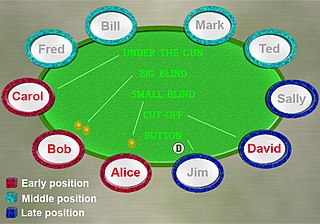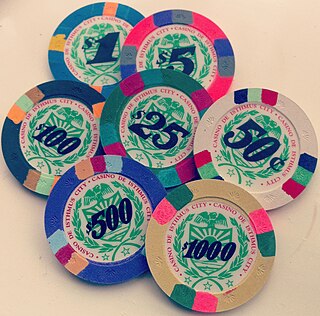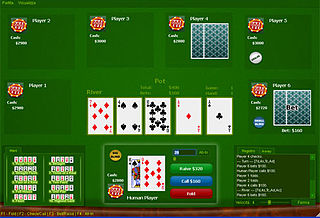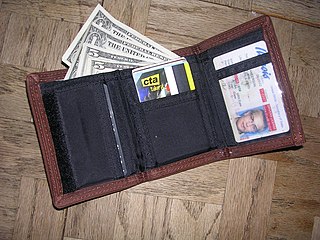
In economics, cash is money in the physical form of currency, such as banknotes and coins.

In the game of poker, the play largely centers on the act of betting, and as such, a protocol has been developed to speed up play, lessen confusion, and increase security while playing. Different games are played using different types of bets, and small variations in etiquette exist between cardrooms, but for the most part the following rules and protocol are observed by the majority of poker players.

A banknote—also called a bill, paper money, or simply a note—is a type of negotiable promissory note, made by a bank or other licensed authority, payable to the bearer on demand. Banknotes were originally issued by commercial banks, which were legally required to redeem the notes for legal tender when presented to the chief cashier of the originating bank. These commercial banknotes only traded at face value in the market served by the issuing bank. Commercial banknotes have primarily been replaced by national banknotes issued by central banks or monetary authorities.
Legal tender is a form of money that courts of law are required to recognize as satisfactory payment for any monetary debt. Each jurisdiction determines what is legal tender, but essentially it is anything which when offered ("tendered") in payment of a debt extinguishes the debt. There is no obligation on the creditor to accept the tendered payment, but the act of tendering the payment in legal tender discharges the debt.

Casino tokens are small discs used in terms of currency in casinos. Colored metal, injection-molded plastic or compression molded clay tokens of various denominations are used primarily in table games, as opposed to metal token coins, used primarily in slot machines. Casino tokens are also widely used as play money in casual or tournament games.

Online poker is the game of poker played over the Internet. It has been partly responsible for a huge increase in the number of poker players worldwide. Christiansen Capital Advisors stated online poker revenues grew from $82.7 million in 2001 to $2.4 billion in 2005, while a survey carried out by DrKW and Global Betting and Gaming Consultants asserted online poker revenues in 2004 were at $1.4 billion. In a testimony before the United States Senate regarding Internet Gaming, Grant Eve, a Certified Public Accountant representing the US Accounting Firm Joseph Eve, Certified Public Accountants, estimated that one in every four dollars gambled is gambled online.

A wallet is a flat case or pouch, often used to carry small personal items such as paper currency, credit cards; identification documents such as driver's license, identification card, club card; photographs, transit pass, business cards and other paper or laminated cards. Wallets are generally made of leather or fabrics, and they are usually pocket-sized and foldable.
Online casinos, also known as virtual casinos or Internet casinos, are online versions of traditional casinos. Online casinos enable gamblers to play and wager on casino games through the Internet. It is a prolific form of online gambling.
In macroeconomics and international finance, the capital account, also known as the capital and financial account records the net flow of investment transaction into an economy. It is one of the two primary components of the balance of payments, the other being the current account. Whereas the current account reflects a nation's net income, the capital account reflects net change in ownership of national assets.

A count room or counting room is a room that is designed and equipped for the purpose of counting large volumes of currency. Count rooms are operated by central banks and casinos, as well as some large banks and armored car companies that transport currency.
Hard count is one process for counting coins in a casino or bank. The hard count rooms are usually among the most secure places due to the large amounts of cash that can be on hand at any one time.
Automated cash handling is the process of dispensing, counting and tracking cash in a bank, retail, check cashing, payday loan / advance, casino or other business environment through specially designed hardware and software for the purposes of loss prevention, theft deterrence and reducing management time for oversight of cash drawer an unable operations.
In monetary economics, redenomination is the process of changing the face value of banknotes and coins in circulation. It may be done because inflation has made the currency unit so small that only large denominations of the currency are in circulation. In such cases the name of the currency may change or the original name may be used with a temporary qualifier such as "new". Redenomination may be done for other reasons such as changing over to a new currency such as the Euro or during decimalisation.

A currency-counting machine is a machine that counts money—either stacks of banknotes or loose collections of coins. Counters may be purely mechanical or use electronic components. The machines typically provide a total count of all money, or count off specific batch sizes for wrapping and storage.

In monetary economics, the currency in circulation in a country is the value of currency or cash that has ever been issued by the country’s monetary authority less the amount that has been removed. More broadly, money in circulation is the total money supply of a country, which can be defined in various ways, but always includes currency and also some types of bank deposits, such as deposits at call.
The following is a glossary of poker terms used in the card game of poker. It supplements the glossary of card game terms. Besides the terms listed here, there are thousands of common and uncommon poker slang terms. This is not intended to be a formal dictionary; precise usage details and multiple closely related senses are omitted here in favor of concise treatment of the basics.
An intelligent banknote neutralisation system (IBNS) is a security system which protects valuable items by rendering them unusable or easily detectable if an unauthorised individual tries to gain access to them. Dye packs are commonly used to safeguard currency against bank robberies in this manner; when such a pack is taken out of the bank, it releases an indelible dye that stains the money with a conspicuous bright color, making it easy to recognise as stolen. Bonding agents (glues) have been used more recently as alternative degradation agents.

Currency packaging includes several forms of packing cash for easy handling and counting. Many systems use standard color-coding or are marked to indicate the amount in the package.

In a cashless society, financial transactions are not conducted with physical banknotes or coins, but instead with digital information. Cashless societies have existed from the time when human society came into existence, based on barter and other methods of exchange, and cashless transactions have also become possible in modern times using credit cards, debit cards, mobile payments, and digital currencies such as bitcoin. However, this article focuses on the term "cashless society" in the sense of a move towards a society in which cash is replaced by its digital equivalent—in other words, legal tender (money) exists, is recorded, and is exchanged only in electronic digital form.
Banknote processing is an automated process to check the security features and the fitness of banknotes in circulation, to count and sort them by denomination and to balance deposits. This processing of currency is performed by security printing companies, central banks, financial institutions and cash-in-transit (CiT) companies.










